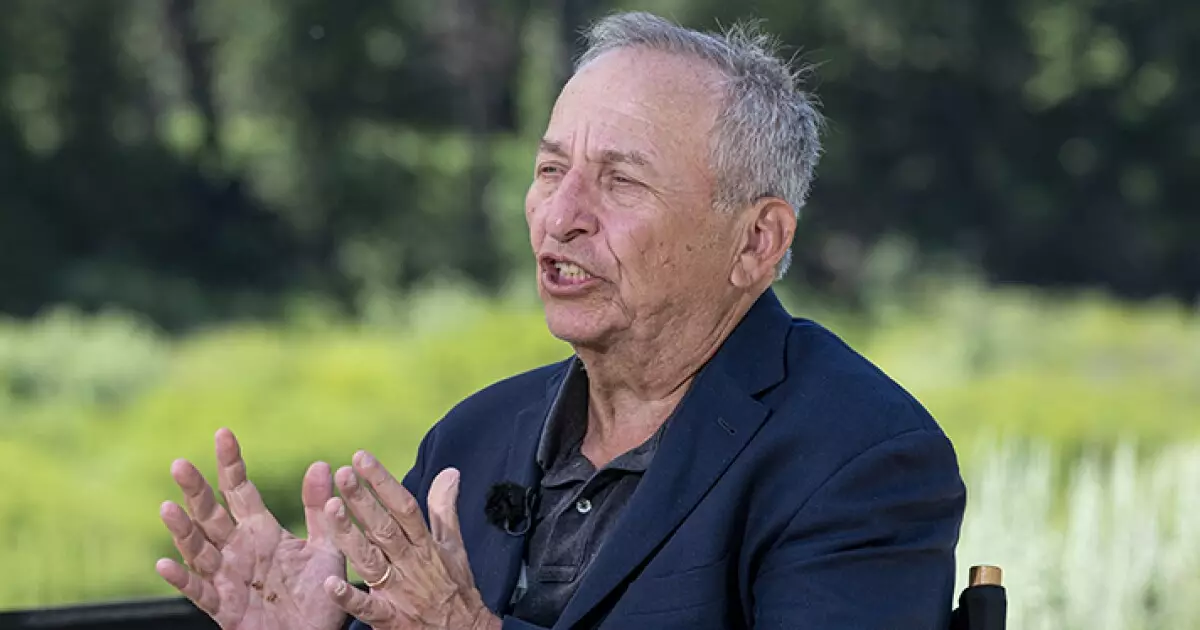In a political landscape often clouded by sensationalism and extreme partisanship, one might hope for a touch of rationality. As former Treasury Secretary Lawrence Summers suggests, Donald Trump’s impending selection for the next chair of the Federal Reserve could defy expectations. Contrary to the president’s recent tirades against Jerome Powell, whom he blames for a stagnant interest rate climate, the former Treasury Secretary implies that Trump may choose a candidate deemed acceptable by both mainstream Republicans and Democrats. This perspective, though encouraging, also underlines a deeper issue: the relationship between politics and monetary policy, which remains incredibly precarious and fraught with potential turmoil.
Summers articulately remarked that he would be “surprised” if Trump chose someone other than a “reasonable person.” The insight here isn’t just in the expectation of appointing a mainstream figure, but in understanding the pressures that guide such political decisions. As economic indicators fluctuate, the consequences of a poorly chosen Fed chair could be more than just political fodder—it could spur destabilizing effects in the already jittery financial markets.
The Executive’s Blame Game
Trump’s ceaseless criticisms of Powell hint at a strategy that extends beyond mere discontent with monetary policy. Appearing in front of eager supporters, Trump quipped about potentially appointing himself as Fed chair, a statement that stirs up both laughter and dread. What sounds like a joke may indeed reflect the mindset of someone who views institutional roles as mere extensions of personal ambition. Herein lies an important truth: by calling for rate cuts, Trump is not merely advocating for economic policy; he is preparing to deflect blame for any future economic downturn onto external forces, including the very institution he aims to control.
Summers aptly points out that this move towards scapegoating reveals a fear of accountability that permeates the Trump administration. By positioning the Fed as an adversary, Trump crafts a narrative wherein any economic fallout is attributed not to his administration’s decisions but instead to a failure of the central bank—a cunning play, but one that could destabilize the foundations of our financial system.
Political Echoes on Economic Forecasts
Economist insights often link macroeconomic policy to broader political goals. Recent burnished economic forecasts crowded with gloomy speculation stem directly from previous policies enacted under Trump, particularly in regard to tariffs. This raises a thorny question: to what extent should a president’s policies inform the Federal Reserve’s decisions? While Summers acknowledges the Fed’s simultaneous upward revisions on both inflation and unemployment forecasts—an unusual occurrence—it is crucial to recognize how past actions can shape upcoming economic realities.
The tariffs Trump imposed for national security, although couched in patriotic rhetoric, threaten to create negative supply shocks. The irony isn’t lost; an administration that prides itself on “America first” is witnessing a constriction of economic growth and employment opportunities. Once celebrated as a protectionist hero, Trump risks facing the fallout from his own misguided strategies as the Fed navigates an increasingly complicated landscape.
Voices of Reason Within the GOP
As the Trump administration approaches its decision on the next Fed chair, sagacious voices from within the Republican Party become increasingly relevant. Summers believes that fear of market instability will anchor the president’s final choice, urging him to consider the merits of selecting a highly respected figure. This anticipation for a sound decision amidst chaos is precarious yet necessary; it indicates that not all Republicans share the fringe sentiments that have shaped Trump’s abrasive governance. A more “fair-minded” appointment may signal, albeit dimly, a reevaluation of the political and monetary landscape.
In a party grappling with its identity and core values, the repercussions of a poor choice for the Federal Reserve chair could reverberate far beyond the financial district. The importance of selecting an individual who can skillfully maneuver economic complexities while safeguarding institutional integrity cannot be overstated. A pivot back to pragmatism might not only stabilize financial markets but also reassure a beleaguered public wary of overreach and incompetence.
The Ominous Path Ahead
As we await Trump’s ultimate decision, the interplay between his personal convictions and necessary economic prudence remains fraught with tension. The backdrop of the 2024 elections looms ominously, whereby any misstep could further entrench partisan divisions. While the notion of appointing a “reasonable person” to the Fed may seem like a cautious approach, one must question whether Trump can genuinely extricate himself from tarnished partisanship long enough to make a sound decision.
With swirling uncertainties—ranging from inflationary pressures to global economic shifts—the stakes have never been higher. If the president acts in good faith, the markets may calm. However, if we’re merely witnessing a prelude to another political spectacle, we may find ourselves trapped in an endless cycle of blame, instability, and uncertainty in the realm of public policy. The impending decision regarding the Federal Reserve chair will unveil whether we’re heading towards a more rational governance strategy, or simply deeper into the chaos of political theater.

